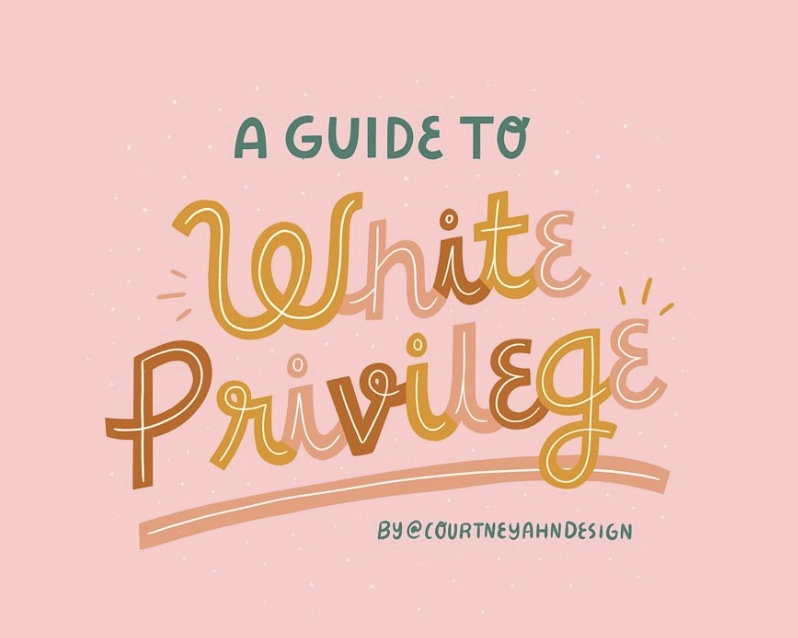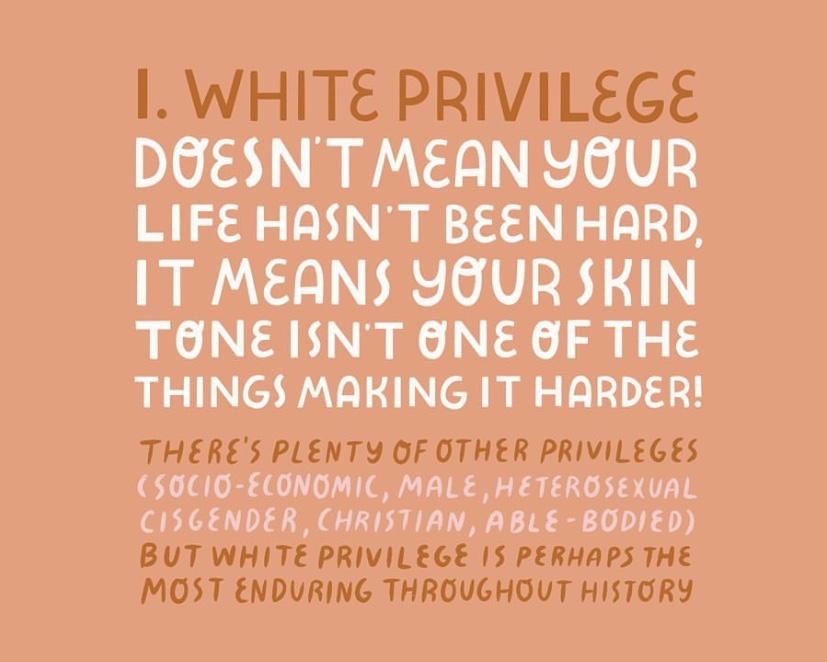KATIE LENDA
Staff Writer

What does it mean to be white in America?
This is a question that I am sure most white people have never really given much thought, because our race is not a part of our identity that we have to factor into our daily lives. We don’t have to think about our race.
This is the epitome of white privilege.
Before I elaborate on what white privilege is, and what we can do to use this privilege in an effective way, I want to express my deepest condolences to every black life that has been taken due to police brutality.
Rest in power to George Floyd, Ahmaud Arbery, Breonna Taylor and the thousands of other cases of black people who have been murdered by law enforcement or civilians that may have not been trending.
So what is white privilege?
Instead of giving a definition, this concept is much easier understood with real life examples.

White privilege is knowing you will never be denied from a job based on your race. White privilege is seeing people that look like you in the media, in your classrooms with fellow students and professors that resemble you or when you were a child, you got to play with dolls that looked like you. White privilege is being sure there is a makeup shade in every brand that will match your skin tone. White privilege is not being afraid for your life if you get pulled over for speeding. White privilege is knowing when you step into a professional setting, you will not be the only person of your race in the room.
Your white privilege is not discrediting your accomplishments or the work you put in to achieve them, but it is saying that your race did not make it more difficult for you to reach these successes.
This goes hand in hand with saying “All lives matter” instead of “Black lives matter.”
Yes, all lives do matter, but black lives specifically, haven’t always mattered in our society. The movement is meant to bring justice to a group of people who have been oppressed for hundreds of years.

There are countless other examples of white privilege, but you can look at Peggy McIntosh’s insightful essay, “White Privilege: Unpacking the Invisible Knapsack” to learn more.
Dr. Martin Luther King Jr.’s essay, “Letter from a Birmingham Jail” is another useful resource to reflect on the history of racism and protests in our country.
It also focuses on how this country has gone too long settling for order instead of true justice.
The essay resonated a sense of stagnancy with me — where is the social progress?
White people must not only be “not racist,” but actively anti-racism. We must use our voices to change this human indecency.
The part of white privilege that can be difficult for people to understand is that we typically don’t see these privileges. Once we recognize there is a distinct and undeniable social difference between people of color and white people in the United States, we are able to use this privilege to raise awareness for racial injustices.
This prompts the next question of what white people can do to help diminish these issues.
We live in a country founded by white men, and this patriarchal white dominance is deeply embedded within our country.

With that being said, killing racism is not going to be an easy or fast process, and this responsibility does not fall solely into the hands of the people it oppresses. White people need to be held accountable for social change as well.
The first thing we can do is educate ourselves on the issue. It is important to be aware of systemic racism and the socioeconomic issues that people of color, specifically black people, face.
I recommend consuming content created by people of color that is meant to educate.
For instance, Ava DuVernay’s documentary, “13th” is incredibly informative and I highly suggest it. “When They See Us,” also directed by DuVernay, is a moving series based on the true story of the group of black and brown men known as “The Exonerated Five.”
These are very powerful pieces and may be triggering or uncomfortable, but that doesn’t mean you shouldn’t watch them; things that make us uncomfortable need to be discussed.
If you want something less visual, I suggest Angie Thomas’ novel, “The Hate U Give.”
It’s a beautifully written story about a young girl whose best friend is murdered by law enforcement.
I also really enjoy Jose Antonio Vargas’ work, specifically his biography “Notes of an Undocumented Citizen” and a documentary titled “White People.”
These works do not specifically address the black experience in America, but they address white privilege as Vargas is a Filipino immigrant.
Another important point is that black people are not responsible for educating white people on how to care for them and respect them, so self-educating is crucial.

There are an abundance of resources to educate yourself, and with a simple Google search, you will be able to find further suggestions.
Once you are educated, you have to take it upon yourself to educate others.
There is no way to create change if we do not speak up when we see injustices, or when people are simply being ignorant.
You may have friends and family members who don’t understand racism in the United States, who might make ignorant or racist comments, consciously or unconsciously.
It is much easier to sit back and ignore whatever they said because you don’t want to have this difficult conversation with your friend or your grandmother.
But by choosing to be silent when we hear people being racist, we add to the problem.
Bystanders are equally as guilty.
If they say something such as, “Well, maybe the reason there are more black people incarcerated than white people is because they commit more crimes,” you can say, “Actually, have you ever thought about how black people in this country are criminalized? How people are taught to fear dark skin?”
White people get into trouble just as much as black people, it’s just that white people can get away with it.
We have no choice but to speak up and educate people who do not understand the history of systemic racism in our country.
We are fortunate enough to have the power to vote for our elected officials.
To put it bluntly, stop voting for racist people.
How is there ever going to be social change if our own president is racist? Let’s use this power to elect someone that wants this change as much as we do.
Odds are if you’re reading this, you have some kind of social media account.
Sharing articles and posts regarding this issue raises awareness for racial injustice.
Mere exposure to the topic is better than no conversation regarding the issue at all, even if the conversation gets heated. Every single one of us has a platform, and it would be a waste to not use social media as a catalyst for this issue.
It is also very important to continue to discuss this issue on social media and in person, regardless of if there has been a viral, recent murder of an innocent black person.
On campus, you can learn more about the different intercultural organizations Fredonia offers.
If you are already a part of a different type of organization, reach out to these groups and see how you can incorporate this topic into one of your club meetings.
Fredonia needs more inclusion and diversity in its clubs and organizations — by collaborating with other groups, we are allowing a healthy and educational conversation regarding the topic.
Every city has a committee for Black Lives Matter, you can reach out to them and do what you can to get involved. Whether that is donating to organizations, going to a meeting, following them on social media or actively protesting, do what you feel is right to support.
As a white person, there are two choices when it comes to our privilege.
We can use it in a selfish way that deliberately chooses to ignore injustices, or we can use this privilege to promote anti-racism, and to speak for those that have been silenced.

George Floyd, and every other black person murdered by the police are not just a hashtag, they are human beings with families that will mourn their loss forever.
Desmond Tutu once said, “If you are neutral in times of injustice, you have chosen the side of the oppressor.”
Use your privilege to address these tragedies and speak up for what is right.
All graphics in this article are by graphic designer, Courtney Ahn. Her Instagram is @courtneyahndesign and you can access her personal website here.
